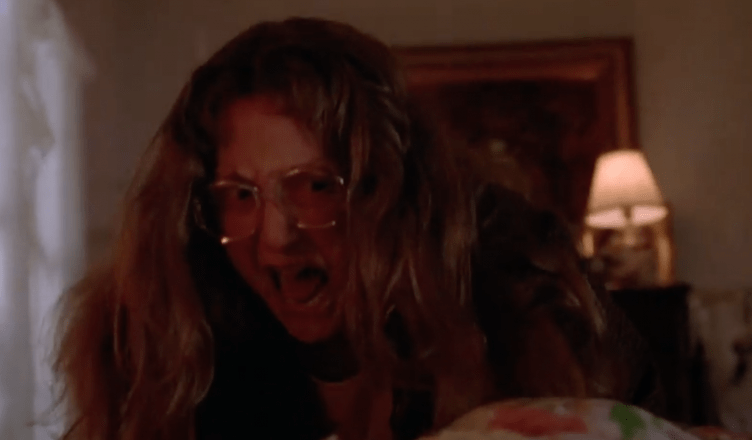Film Deets:
Director: Cindy Sherman
Screenplay: Todd Haynes, Tom Kalin, Elise MacAdam, Cindy Sherman
Actresses: Carol Kane, Molly Ringwald
Category: Sexual Harassment
Themes: Harassment, Microaggressions, Trauma
Why do these screams matter?
Office Killer is a satirical deep dive into what happens when microaggressions and water cooler gossip simply become too much to bear. An awkward but exceedingly talented magazine editor Dorine (Carol Kane) is instantly relatable as the woman in the office whose abilities make her colleagues seek her out for help, even while they continually exclude her from social events. The film suggests that this passive-aggressive form of bullying is enough to make anyone snap and, eventually, that’s exactly what happens to Dorine.
Our first screams are two separate moments that happen sequentially in the film and work in tandem to showcase the harassment Dorine experiences in the workplace daily. The first scream occurs when Dorine has been notified that she is being demoted to part-time as a company cost-saving measure and that she will now be expected to work from home. Robbed of the security that her job provides her, Dorine is overcome with anxiety and is approached by the recently promoted Norah Reed (Jeanne Tripplehorn).
The second scream in this sequence is not a scream at all but the absence of one. Here, Dorine is working at night alone with her boss. When she requests help with her computer, her boss begins to rub her shoulders inappropriately. While Dorine’s fear is palpable, she is only able to respond with a whimper.
These two moments do not work in isolation from one another but are intended to satirize very specific experiences women face in the workplace. Dorine’s ability to scream in the presence of a female colleague initially suggests a camaraderie between the women that at first reads like an empowering feminist statement. But Norah’s inability to remember Dorine’s name, even though she is the one who executed Dorine’s demotion, is a reminder to the audience that workplace microaggressions can come from female colleagues just as easily as they can come from male colleagues. Still, Dorine doesn’t fear Norah at this moment and her scream is more of a response to being terrorized by a capitalistic structure that views workers as dispensable, a structure further complicated by gender discrimination.
The second “scream” demonstrates the silence that can come when fear enters into the equation. There is a clear power imbalance between Dorine and her boss that is then compounded by his touching Dorine inappropriately. His actions, which are largely confined to his placing his hands on her shoulders as he stands over her from behind, are not frightening to Dorine because they are physically painful but because of the aggression and sexual violence that they imply. Dorine’s lack of a scream at this moment, despite her look of abject terror, is a reflection of the very real phenomenon of silence that frequently accompanies moments of workplace sexual harassment.
Although the term “sexual harassment” was coined in 1975, public awareness about recourses available to employees was still very limited (Swenson). David Crary in The Seattle Times notes that “In 1998, a pair of Supreme Court rulings prompted many employers to adopt anti-harassment policies and formalize mechanisms for employees to lodge confidential complaints.” So, for people like Dorine, who were never given clear guidance about how to handle issues of sexual harassment, silence was frequently the only real option available because complaining could jeopardize your job.
But silence has consequences, and we see one possible outcome in our next scream. Taking a smoke break alone in the stairwell, Kim (Molly Ringwald), one of the work colleagues who is forever excluding Dorine, is attacked when someone sneaks up behind her and attempts to strangle her with a scarf.
We know that the assailant is Dorine, and the fact that she is now turning her suppressed rage toward her female colleagues is not coincidental. The revelation that Dorine was sexually abused by her father reframes somewhat her previous experience of sexual harassment with her male boss: it suggests that all forms of abuse, even while varying in force and violence, are interconnected. For Dorine, both the abuse she endured at the hands of her father and the unwanted touching and ridicule she endured from her colleagues all stem from systematic male privilege and a cultural reluctance to believe women who have experienced abuse.
Dorine directs her violence toward other women because she has learned from her own experiences that you can get away with abusing women. And, in a way, she is right. Kim, who survives Dorine’s attack, immediately goes to Norah’s office to report Dorine, and what happens? You guessed it. No one believes Kim, and Dorine’s reign of terror continues unchecked. It’s a scathing critique of how women can replicate violence in the workplace when corporate cultures fail to protect all of their employees.
Works Cited
Crary, David. “Before the 1990s, there was little recourse for sexual-harassment victims.” The Seattle Times, 17 Dec. 2017.
Office Killer. Directed by Cindy Sherman, performances by Carol Kane, Molly Ringwald, and Jeanne Tripplehorn, Good Machine, 1997.
Swenson, Kyle. “Who came up with the term ‘sexual harassment’ ?” The Washington Post, 22 Nov. 2017.







